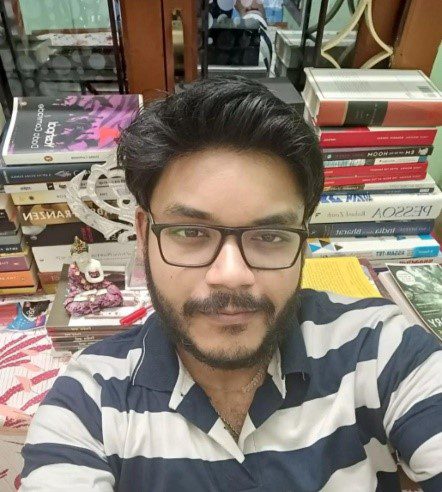INTERVIEWEE: Banojyotsna Lahiri, Writer and Activist
INTERVIEWER: Kabir Deb, Interview Editor, Usawa Literary Review
KD: Hello Banojyotsna! How are you doing? How’s our Comrade Umar doing?
BL: Hi, I am surviving, which is to say I am doing fine. Umar has been in a prolonged and unjust incarceration for more than four years now. It is difficult to be fine under such circumstances, but still his spirits are high and he is holding up great.
KD: What does Freedom mean to you and Umar?
BL: The normal definition of freedom is to be able to act, move, think or speak without limitations, coercions or control. As normal citizens we also want these basic rights of freedom for us and every other citizen in the country.

KD: India has seen a web of lies to control the wings of freedom. How does propaganda operate in the present time?
BL: Right now propaganda is one of the most potent weapons of the ruling class to perpetuate the fascist regime. And that has always been the case in history. Relentless propaganda right now fortifies the falsification of history, vilifies marginalised communities and perpetuates the majoritarian hysteria about an imaginary victimhood. It helps create false enemies and divert people’s attention from the loss of lives and livelihoods that they are constantly being subject to. Propaganda divides a unified working class and absolves the ruling regime of its repressive ways.
KD: Distressing times operate on the back of fear and fabrication. What, according to you, led to the death of Gauri Lankesh, Stan Swamy and the arrest of those who stood to speak for the values of the nation?
BL: As I mentioned earlier the ruling class thrives on propaganda. And as George Orwell had said, ‘in a time of universal deceit, speaking the truth is a revolutionary act’. Gauri Lankesh, Father Stan Swamy, Dr Saibaba, the Bhima Koregaon detainees or the ones falsely accused in Delhi Riot have all dared to speak out truth in the face of power. Both their acts of truth and dare earned them the wrath of the state. Because courage is contagious, the state felt the need to silence them by either killing or jailing them, lest their courage and truth both spread.

KD: Speaking of values – what do you think changed in the country post-2010? And how is it penetrating the Gen-Z generation and becoming a pop-culture phenomenon?
BL: Change towards the fall of the country’s basic values is not something that came after 2010. It has been happening with every regime that operates to ruin the basic ethics of humanity. After 2010, we got to see a naked attack on the Constitution and how the public appropriates the attack. From the lynching of the minority community to curbing every protest, we have seen a more technologically developed society doing everything possible to justify violence. The pop-culture phenomenon accepts the violent nature of the leaders and gives it the shape of an emotion that is easily acceptable.
KD: We live in hope. What is helping Umar hold on to hope? Also, as his partner, how do you deal with a situation like this especially when social media is crossing all borders to ruin personal lives?
BL: Well the last four years have been pretty hopeless and dystopic. But at the same time, we also witnessed the great Farmers’ protest that forced the ruling class to bite dust, the democratic will of the people were exercised despite huge corruption and coercion that at least reduced the mandate of the incumbent government. The collective will of the people gives us hope. The judiciary has also passed some good orders upholding liberty. That too gives up hope. I don’t let social media take control of my lives or thoughts. That helps me filter out toxicity from life.
KD: We know that Umar reads a lot. Could you share what he is reading these days?
BL: He was reading classics. Two Dostoevskys back to back, then Sophie’s Choice by William Styron. Also two books on Bhima Koregaon, by Alpa Shah and Ajaz Ahmed. These are the current reads.
KD: Celebrating hatred should not have been a trend in the course of development. What do you think went wrong for nations like India or the USA or even Bangladesh
Lenin said more difficult than doing a revolution, is to sustain it. Same thing goes for democracy as well. We often take for granted a nation to be democratic on paper, while in reality its core values are eroded and taken over by majoritarian supremacist tendencies. A democracy can only be evaluated by assessing how much it protects the minorities and marginalized communities, gender or race. So what’s going on in the US, India or Bangladesh are those relentless struggles for democracy, which is not just your right to vote but your everyday battle to safeguard and extend the democratic values. As democracy erodes, majoritarian hatred for minorities and marginalised communities become the driving force for anti-democratic fascist powers. So in all the democratic countries, the struggle to sustain and expand democracy is a constant and timeless struggle.

KD: If you have to give a message to the people of India, on behalf of Umar and as a woman, what would be that?
Our diversity is our strength. The religious, linguistic, cultural diversity is what has sustained this country and its democracy. Being tolerant and respectful towards other cultures and communities and co-existing with dignity gives us the ultimate strength, peace of mind and security. Let us fight together to preserve our diversity as well as the values enshrined in the constitution of the country.
Kabir Deb is the interview editor of Usawa Literary Review.

Subscribe to our newsletter To Recieve Updates
Join our newsletter to receive updates